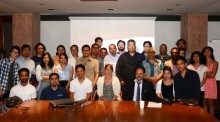A calamitous earthquake struck Nepal on Saturday afternoon, April 25, 2015. A few hours later as the City of Toronto—some 12 hours away from Kathmandu—was waking up to a weekend morning, the extent of the crisis was only beginning to become apparent. The Asian Institute’s Associate Director Eileen Lam contacted affiliated faculty member and Nepal expert, Professor Katharine Rankin, about hosting a breakfast fundraiser that would send a signal to the Nepali community in Toronto that we want to help. This query sparked the University’s, and the city’s, first-ever face-to-face meeting of Nepal scholars, Nepali associations, diplomats, and community members. The breakfast fundraiser collected over $6,000 for a reputable grassroots, youth-led relief organization. Afterwards, 20 attendees gathered to participate in a discussion that launched Asha Toronto, an initiative to coordinate a Toronto-based contribution to relief and rebuilding. Named after the Nepali word for hope, Asha Toronto established a presence on Facebook and obtained support from the Asian Institute.
Asha Toronto has quickly gained momentum. It has drawn together a cohort of scholars and community members with impressive collective networks within the public sector and civil society in Canada and Nepal. At the inception stage, the organization has focused on informing itself about the front lines of relief and rebuilding in Nepal. Weekly meetings feature Skype conversations with colleagues in Nepal who are playing leadership roles in policy, media, on-the-ground relief and rescue, finance, social science research, and social movements. These interactions create the grounds for a combination of critical discussion and organizing activity within the organization.
A second order of business for Asha Toronto has been to structure itself through the formation of working committees—a media committee that organized an interview on CBC’s Metro Morning with writer Manjushree Thapa (May 25, 2015); a web design committee; and a coordinating committee, which guides planning to work with the governments of Canada and Nepal, conduct policy advocacy in Nepal, and liaise with the Asian Institute.
At the Asian Institute, the tragic circumstances of a crisis in one of the poorest countries of the region affords an opportunity to examine crucial issues that have been identified as priority areas—poverty, governance, urbanization, global health, climate change, and infrastructures—in a context where collaboration between policy makers, social scientists, engineers, and doctors has become directly critical to the lives and livelihoods of millions of people. Asha Toronto brings a wealth of human capital to this endeavour. Its members include post-doctoral engineering students at U of T, graduate students in fields across the humanities and social sciences, U of T faculty with long-time expertise in Nepal, U of T alumni working in the health and IT sectors, leaders of the Nepali community in Toronto, and development practitioners. “Together these individuals bring extraordinary professional and social networks in Nepal into the halls of the Asian Institute every week,” Rankin emphasizes. “Links with Nepal’s National Planning Commission, the Nepal Bankers’ Association, the top echelons of political parties, almost every government ministry, the donor agencies, and the leading, most competent of local organizations that are carrying out the daily business of relief and rebuilding.”
Rankin and doctoral candidate Pushpa Acharya, also affiliated with the Asian Institute, suggest that the momentum of Asha Toronto provides an opportunity to imagine a University of Toronto response that would support the crucial role of social science scholarship in informing relief and rebuilding. In recent years, Rankin notes, “Nepal has witnessed a flourishing of independent, critical, rigorous social science scholarship that has pioneered globally recognized models for conjoining research, policy intervention, social science training, and the promotion of public deliberation of critical issues.” Asha Toronto seeks to support these critical institutions now, while also promoting events and initiatives at the Asian Institute that would benefit students of anthropology, history, political science, geography, sociology and other cognate disciplines. Its capacity to do so will benefit from the cross-regional conversations that distinguish the Asian Institute. In turn, perhaps the unique model of university-community collaboration being worked out in the context of a crisis in South Asia can productively inform our understanding of area studies at the Asian Institute.
